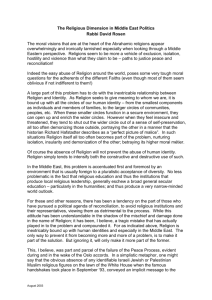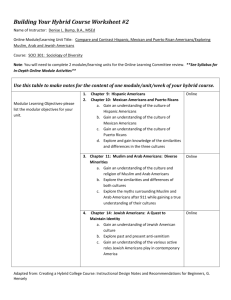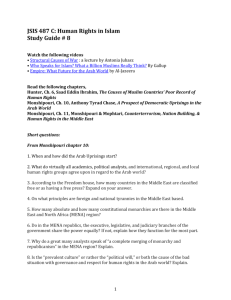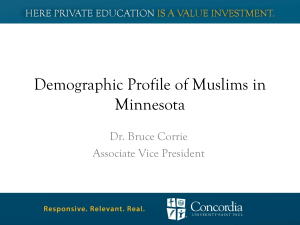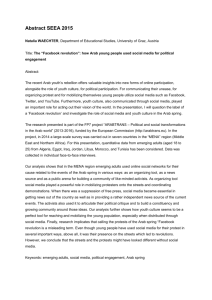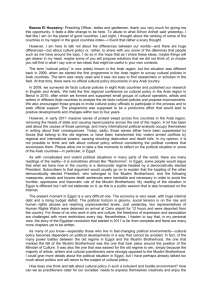Religion as a Tool For Good and Evil
advertisement
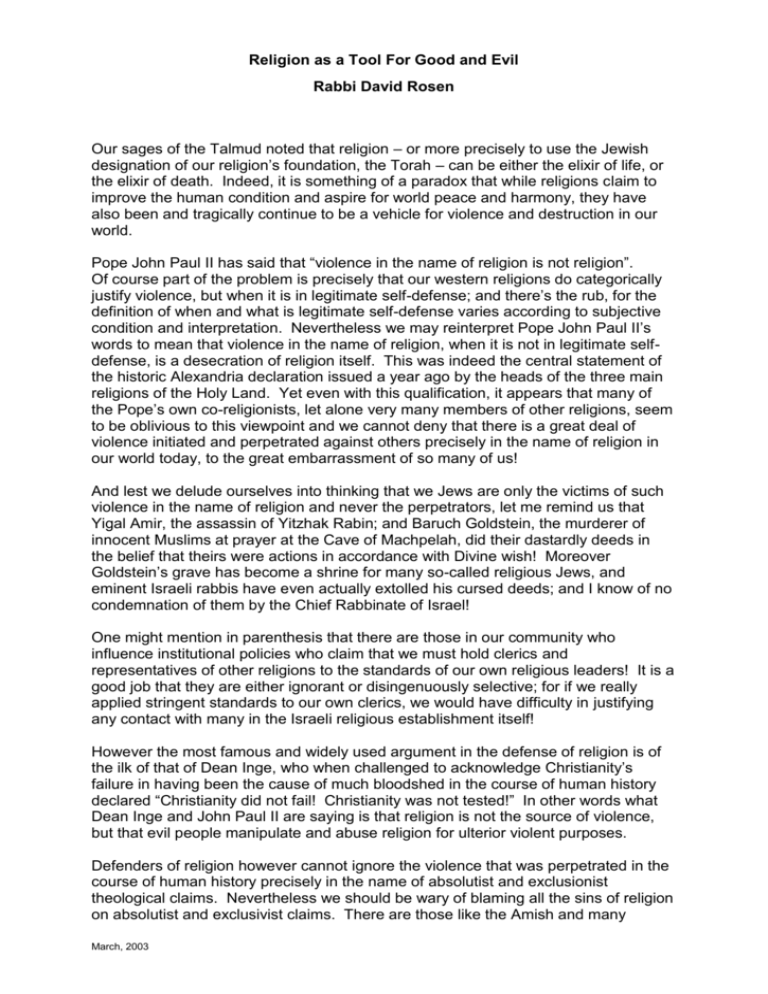
Religion as a Tool For Good and Evil Rabbi David Rosen Our sages of the Talmud noted that religion – or more precisely to use the Jewish designation of our religion’s foundation, the Torah – can be either the elixir of life, or the elixir of death. Indeed, it is something of a paradox that while religions claim to improve the human condition and aspire for world peace and harmony, they have also been and tragically continue to be a vehicle for violence and destruction in our world. Pope John Paul II has said that “violence in the name of religion is not religion”. Of course part of the problem is precisely that our western religions do categorically justify violence, but when it is in legitimate self-defense; and there’s the rub, for the definition of when and what is legitimate self-defense varies according to subjective condition and interpretation. Nevertheless we may reinterpret Pope John Paul II’s words to mean that violence in the name of religion, when it is not in legitimate selfdefense, is a desecration of religion itself. This was indeed the central statement of the historic Alexandria declaration issued a year ago by the heads of the three main religions of the Holy Land. Yet even with this qualification, it appears that many of the Pope’s own co-religionists, let alone very many members of other religions, seem to be oblivious to this viewpoint and we cannot deny that there is a great deal of violence initiated and perpetrated against others precisely in the name of religion in our world today, to the great embarrassment of so many of us! And lest we delude ourselves into thinking that we Jews are only the victims of such violence in the name of religion and never the perpetrators, let me remind us that Yigal Amir, the assassin of Yitzhak Rabin; and Baruch Goldstein, the murderer of innocent Muslims at prayer at the Cave of Machpelah, did their dastardly deeds in the belief that theirs were actions in accordance with Divine wish! Moreover Goldstein’s grave has become a shrine for many so-called religious Jews, and eminent Israeli rabbis have even actually extolled his cursed deeds; and I know of no condemnation of them by the Chief Rabbinate of Israel! One might mention in parenthesis that there are those in our community who influence institutional policies who claim that we must hold clerics and representatives of other religions to the standards of our own religious leaders! It is a good job that they are either ignorant or disingenuously selective; for if we really applied stringent standards to our own clerics, we would have difficulty in justifying any contact with many in the Israeli religious establishment itself! However the most famous and widely used argument in the defense of religion is of the ilk of that of Dean Inge, who when challenged to acknowledge Christianity’s failure in having been the cause of much bloodshed in the course of human history declared “Christianity did not fail! Christianity was not tested!” In other words what Dean Inge and John Paul II are saying is that religion is not the source of violence, but that evil people manipulate and abuse religion for ulterior violent purposes. Defenders of religion however cannot ignore the violence that was perpetrated in the course of human history precisely in the name of absolutist and exclusionist theological claims. Nevertheless we should be wary of blaming all the sins of religion on absolutist and exclusivist claims. There are those like the Amish and many March, 2003 2 among the Haredi, ultra-Orthodox Jewish community, who pose no violent threat whatsoever, but to the contrary, wish to be left alone by the world outside. Nevertheless it is certainly true that most conflicts that are portrayed as religious conflicts are not in essence anything of the sort. Whether between Hindus and Muslims in Kashmir; Buddhists and Hindus in Sri Lanka; Christians and Muslims in Nigeria or Indonesia; Protestants and Catholics in Northern Ireland; or between Muslims and Jews in the Middle East; these conflicts are not at all religious or theological in origin! They are all territorial conflicts in which ethnic religious differences are exploited and manipulated, often mercilessly. However this fact still begs the question. Why and how is it that religion is so easily exploited and abused to the extent that it becomes a force for evil or at least an active handmaiden of evil? The answer I believe is to a great deal implicit in the aforementioned point itself – namely the socio-cultural and political context in which religion functions. Because religion seeks to give meaning and purpose to who we are, it is inextricably bound up with all the different components of human identity from the most basic such as family, through the larger components of communities, ethnic groups, nations and peoples, to the widest components of humanity and creation as a whole. These components of human identity are the building blocks of our psycho- spiritual well being and we deny them at our peril. Popular writers and scholars studying the modern human condition have pointed out just how much the counterculture, drug abuse, violence, cults etc. are a search for identity on the part of those who have lost the traditional compasses of orientation. You will recall the work of Alvin Toffler some thirty years ago, Future Shock, in which he pointed out how the pace and deracination of modern society leave people not only disorientated but alienated, seeking new structures and stimulation to restore a sense of loss of identity. In the relationship between religion and identity, the components or circles within circles of our identity affirm who we are; but by definition at the same time they affirm who we are not! Whether the perception of distinction and difference is viewed positively or negatively, depends upon the context in which we find or perceive ourselves. Another popular writer on animal and human behavior, Robert Ardrey, referred to three basic human needs: security, stimulation and identity. Ardrey pointed out that the absence of security serves as automatic stimulation that leads to identity. When people sense a threat, such as in wartime, you don’t have a problem of loss of identity. The very absence of security itself guarantees the stimulation that leads to strengthening of identity. Indeed because religion is so inextricably bound up with identity, religion itself acquires far greater prominence in times of threat and conflict, nurturing and strengthening the identity that senses itself as threatened, in opposition to that which is perceived as threatening it. Indeed such is the role of the ancient Hebrew prophets in relation to the people when in exile. Then they do not challenge their lack of moral responsiveness and ethical outreach – that they do when the people are secure. In times of insecurity their role is to defend and enhance the identity that is under threat. March, 2003 3 The scholar Rene Girard has pointed to the need for religion to identify scapegoats and the historian Richard Hofstadter has pointed out how in times of conflict people have the need to portray their opposition, their enemy, as a “perfect image of malice”! In such situations of conflict, religion as a vehicle of comfort, nurture and solidarity, all too often becomes so introspective even to the point of total alienation from and demonization of the other. (Of course, the representatives and apologists of the respective religion do not see it in that way. As mentioned above, they will portray their behavior as legitimate self-defense!) The image of a spiral may prove useful here. The small circles of our identity can and should open up into the wider circles, enriching human society as they do so. However if these smaller components of identity feel insecure within the wider context; instead of spiraling out, they cut themselves off and isolate themselves from the wider circles from which they are alienated. There can be different reasons for such alienation – economic, political, and above all psychological; but “chauvinism” and what we popularly (though incorrectly) call “fundamentalism”, are manifestations of such alienation. In such situations of conflict we tend to find that religious leaders, more often than not, become part of the problem more than the solution - focused on their own communities to the point of insularity and isolation. There are those, like the late John Lennon, who think that the solution to this problem lies in the elimination of different identities: “Imagine there’s no countries, it isn’t hard to do, nothing to kill or die for, no religion too!” But as already indicated, not only is the problem not identity itself (rather it is a question of how we use it), but divesting these components of our identity will only backfire on us with a vengeance as they are so necessary for our psycho-spiritual equilibrium and well-being. Nevertheless because religion addresses not only the smallest components of identity, but also the widest; it is precisely religion that has such special capacity to counteract abuse that comes from insularity and xenophobia, through emphasizing and promoting the awareness of the wider circles of our common humanity and concomitant universal moral responsibility. However as I have mentioned, to do so requires a sense of security on the part of those smaller components of identity within the wider circles. Within contemporary human society, the Muslim world to a large degree and the Arab world to an overwhelming extent, provide the most striking examples of insecurity and alienation that manifest themselves in hostility towards the outside, wider circles of human identity. This is in such marked contrast with the period of Islamic glory that came from the Arab world to create what we refer to as the Golden Age of Spain, feeding back into the Arab world and to civilization as a whole. Islamic society and leadership demonstrated a remarkable tolerance and example of interreligious cooperation, as it trailblazed cultural, scientific and philosophical endeavor. To get a sense of that glory and achievement, I recommend to you a lovely scholarly yet easily readable March, 2003 4 book by Professor Maria Rosa Menocal of Yale University, entitled The Ornament of the World, published by Little, Brown & Co. This is not the place and time for a survey of the history of Islamic culture and how and why it regressed from those amazing heights; but the fact is that Islamic society went from great self-confidence to a sense of great defeat, which became nothing less than a historical complex particularly within the Arab world, manifest in a deep sense of injury and humiliation. This was of course compounded and exacerbated by the imposition of foreign power in the pursuit of its own political, economic and cultural interests. However it is disingenuously convenient and self-deceptive to put the blame for the woes of Arab society at the feet of colonialism. In fact the real challenge did indeed bear colonialism on its decks, but was also precisely that which brought about the demise of colonialism itself. The challenge was and is – Modernity! At the heart of modernity is the concept of individual autonomy. I of course would claim that this is fundamentally a Jewish concept, rooted in the Biblical teaching that each and every person is created in the “Divine Image”, i.e. of inalienable value and dignity. Nevertheless in making the individual the ultimate arbiter in life’s decisions, modernity not only facilitated political democracy and the advance of human rights etc.; ipso facto it also undermined traditional authority and communal loyalties, and thus posed a challenge to the power of religious institutions and authority itself! Christianity and Judaism in the West increasingly understood that unless they engaged modernity constructively – which meant if not adapting, at least reinterpreting their traditions in a manner meaningful for modern society – they would loose their relevance. We have had time and place for such adaptation, reinterpretation, adjustment or repackaging in different ways, reflected today in our different denominations or streams. (Indeed even the way I refer to Genesis as support for democratic values, is a reflection of a modern Orthodox response to modernity.) However the overwhelming majority of the Muslim world and even more so of the Arab world, has not had that luxury and has been suddenly and intensely challenged by modernity as it has never been challenged before. The absence of a cultural evolution that Western society has undergone, has placed Arab society generally at an enormous disadvantage not only technically and functionally, but perhaps above all psychologically. While much of the Muslim world languishes in poverty and marginalization (itself substantially a testimony to its lack of modernity); if anger at such a predicament is expressed, the natural target is usually those societies’ own corrupt leadership. However perhaps somewhat paradoxically, the greatest sense of hostility towards the modern Western world born out of Muslim Arab identity’s insecurity in that wider context, comes precisely from those who encounter that wider Western modern context through a modicum of education and through travel, as well as telecommunications. This sense of alienation leads to a deeper immersion in that alienated smaller circle of identity, typified in intense particularist religiosity and insularity that all too often, as indicated above, demonizes those outside their circle as enemies and uses this scapegoat as the means of inciting the marginalized masses. March, 2003 5 We are all familiar with the proximity of the superiority complex and the inferiority complex. The case in question is a classic example of this. In order to cope with a sense of injury, victimization and humiliation, both historic and contemporary; the Islamicist extremist affirms that the rest of the world is not only inferior and degenerate, but worse. However because Islam teaches that the faithful are God’s elect (similar to the Jewish view of the children of Israel) and thus should enjoy the upper hand, he is profoundly perplexed by contemporary Islamic society’s generally inferior position. The conclusion drawn by these “fundamentalist” elements is that the success of the Western world by definition is illegitimate; it is “ungodly”; it is “of the devil”! In this distorted world outlook, the State of Israel is portrayed precisely as the diabolical agent of the West; a bridgehead of colonialism; an agent of the Crusaders (ironic indeed, considering how many Jewish communities of the Rhine as well as of the Holy Land itself were decimated by the Crusaders!) For how else is one to explain- those tortured minds argue – the amazing success of a little country in the face of the overwhelming surrounding Arab world; a success not only evident in military terms but also in its technological, scientific and economic development unparalleled anywhere in the Arab world. In can only be, they argue, the result of the fact that Jews are in the pay of the West and in league with the Devil. Indeed the Muslim world and especially Arab society’s totally disproportionate and distorted focus upon Israel and the conflict in which it has been embroiled, reflects the fact that it embodies for them far more than the actual conflict itself. The preoccupation with the plight of the Palestinians (all too often with the utmost hypocritical disregard for the real wellbeing of Palestinian society) has actually far less to do with the problems of the Palestinians themselves, than it has to do with psychological hang-ups within the Arab world and to a lesser degree the Muslim world at large. In fact the Israeli-Palestinian conflict serves as something of a lightening conductor for a plethora of historical and contemporary complexes. Rather than confronting these with the painful honesty and clarity that they require, it is so much more comfortable to blame everything on a conspiratorial collusion of the West, Christendom and the Devil, in which the Jewish State is the “bridgehead”! It is this tragic sense of total war and conflict that nurtures the identity of such “fundamentalism”, perceiving precisely itself as an island of godliness within an overwhelming hostile godless sea! This phenomenon in which religion nurtures anti-modern alienation from society at large and yet is married to modern technology in a manner capable of wreaking havoc and destruction on an unparalleled scale, confronts us with two challenges. The first is to defend ourselves. Of course self-defense is not an unqualified right in Judaism. The Talmud in tractate Sanhedrin makes it clear that if you can neutralize or prevent an attack without killing the potential assailant, but you do kill him – then you are a murderer, even if you had a legitimate claim to self defense or the defense of others. It is not only the ends but the means that are a moral imperative for Judaism. Nevertheless, Judaism is not pacifistic! Not to act in defense in face of a threat is to be guilty of the most serious moral failure. “You shall not stand idly by while your brother’s blood is spilt”, the Torah declares in Leviticus Chapter 19. March, 2003 6 Yet as important as it is to fight against threats, Judaism knows that it is not a solution. “Who is the real hero?” our sages ask, and respond “He who turns his enemy into a friend!” It is not enough to be reactive. Moreover to remain aloof and not seek out voices of moderation is to play into the hands of the extremists. We have to take legitimate calculated risks in engaging and promoting dialog with Muslim society. For a religion to be a force for good rather than evil, those whose identities are inextricably bound up with it, need to feel that they can function in a friendly environment. Insecurity will prevent the expression of the universalist values within our respective religious heritages. That is why dialog with all other religious groups, but especially with Muslims, is a strategic imperative not just for their wellbeing, but for ours and for our society as a whole. Yet the degree to which those communities will be able to respond, will depend upon how psychologically and culturally secure they feel within the modern world. Accordingly, modernization, democratization and the advance of human rights are of the greatest significance in helping prevent religion from being exploited for evil purpose. This process of modernization is not without its risks, as the American Jewish community as much as any other if not more so, knows painfully only too well. But it is nevertheless precisely the secret of US Jewry’s success as a community – comfortable in the wider society and contributing to it, while maintaining its own identity at the same time. Indeed it is this historic achievement – truly in the prophetic mode – of maintaining our particularity and its commitments while affirming universal values and aspirations, that that has enabled American Jewry to be a paradigm of the process by which a religious identity can live up to its métier as a force for good, healing and harmony in the world. March, 2003


